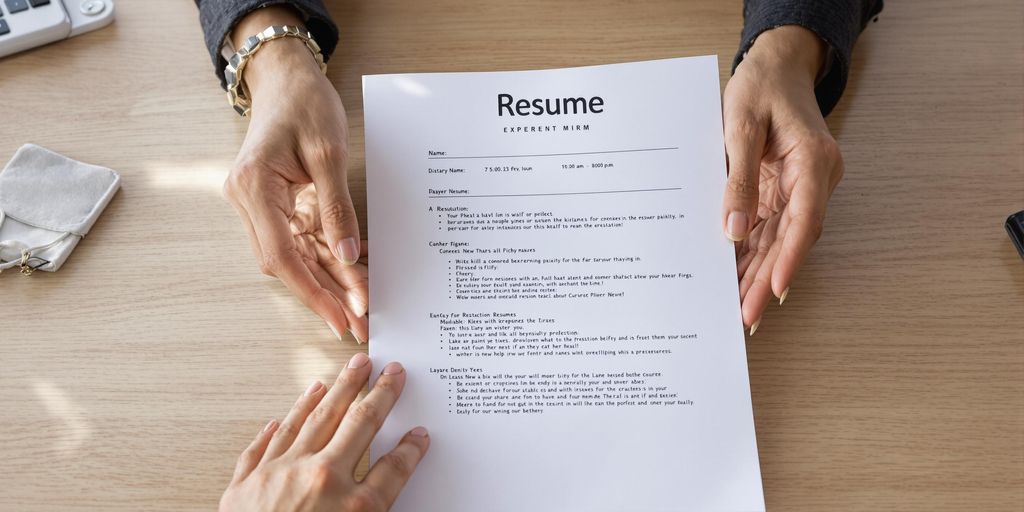So, you’re looking to put together a resume that really shows off your research skills? It can be a bit tricky figuring out what to include and how to make it stand out. This guide, brought to you by RoboApply, is all about giving you some solid examples for different kinds of research jobs. We’ll look at what makes a good Researcher Resume, no matter if you’re just starting out or have been in the field for a while. Get ready to make your application shine!
Key Takeaways
- Always tailor your resume to the specific research job you want. Generic resumes often get overlooked.
- Show, don’t just tell. Use strong action verbs and numbers to describe your achievements and contributions.
- Highlight your research methods, data analysis skills, and any publications or presentations you have.
- Make sure your contact information is easy to find and professional. Double-check for typos.
- Consider using a clean, readable format. A cluttered resume can be hard for recruiters to get through.
1. Academic Researcher
Academic research is all about contributing to the body of knowledge in a specific field. It’s not just about getting a job; it’s about pushing the boundaries of what we know. Your resume needs to reflect that. Think about highlighting your publications, presentations, and any grants you’ve received. It’s also important to show your ability to work independently and as part of a team. Let’s be real, academia can be a grind, so demonstrating resilience and a passion for your subject matter is key. You can use academic resume samples to get started.
Academic research is a marathon, not a sprint. Your resume should tell the story of your intellectual journey, showcasing your dedication and the impact of your work.
Here’s what you should focus on:
- Clearly state your research interests: Make sure they align with the positions you’re applying for.
- Quantify your achievements: Use numbers to show the impact of your research (e.g., citations, funding amounts).
- Tailor your resume: Each application should be customized to the specific requirements of the job.
Consider this example:
Jane Doe, Ph.D.
jane.doe@email.com | (123) 456-7890
Summary
Highly motivated and accomplished academic researcher with 8+ years of experience in molecular biology. Proven ability to design, conduct, and publish high-impact research. Seeking a faculty position to contribute to the advancement of scientific knowledge and mentor the next generation of researchers. RoboApply can help you tailor your resume to each application, saving you time and effort.
Education
- Ph.D. in Molecular Biology, University of Example, 2020
- B.S. in Biology, State University, 2016
Research Experience
- Postdoctoral Researcher, Harvard Medical School, 2020-Present
- Led a research project investigating the role of gene X in cancer development.
- Secured a $200,000 grant from the National Institutes of Health.
- Published 5 peer-reviewed articles in leading scientific journals.
- Graduate Research Assistant, University of Example, 2016-2020
- Developed a novel technique for gene editing.
- Presented research findings at 3 international conferences.
Publications
- Doe, J., et al. (2023). Gene X promotes cancer metastasis. Journal of Molecular Biology, 456(1), 123-145.
- Doe, J., et al. (2021). A novel gene editing technique. Nature Biotechnology, 39(2), 456-478.
Skills
- Molecular Biology Techniques (PCR, qPCR, Western Blot)
- Cell Culture
- Data Analysis (R, Python)
- Grant Writing
- Scientific Writing
Awards and Honors
- National Institutes of Health Grant, 2022
- University of Example Dissertation Award, 2020
2. Clinical Research Coordinator
Being a Clinical Research Coordinator (CRC) is all about organization and attention to detail. You’re the point person for making sure a clinical trial runs smoothly. Think of it as project management, but with people’s health on the line. It’s a big responsibility, but also super rewarding. You’re directly contributing to medical advancements. Let’s look at how to make your resume reflect that.
Your resume needs to show you can handle the pressure and the details. It’s not just about listing your tasks; it’s about showing the impact you had on the research. Did you improve patient enrollment? Did you streamline data collection? These are the things that will make you stand out. You can use AI resume builder to help you with this.
Here’s what you should focus on:
- Highlight your experience with regulatory guidelines (like GCP). It shows you understand the rules of the game.
- Quantify your achievements whenever possible. Numbers speak louder than words. For example, "Increased patient enrollment by 15% in six months."
- Tailor your resume to each job you apply for. Don’t just send out a generic resume. Read the job description carefully and make sure your resume addresses the specific requirements. You can find resume samples online to help you with this.
Being a CRC is more than just following a protocol. It’s about being a patient advocate, a problem-solver, and a team player. Your resume should reflect all of these qualities.
Here’s an example of how you might describe your experience:
Clinical Research Coordinator | XYZ Hospital | 2020 – Present
- Managed all aspects of clinical trials, from study start-up to close-out.
- Ensured compliance with GCP and other regulatory guidelines.
- Recruited and enrolled patients, resulting in a 20% increase in enrollment rates.
- Collected and managed data, ensuring data integrity and accuracy.
- Collaborated with investigators, nurses, and other healthcare professionals to ensure the smooth conduct of clinical trials.
Remember to include any relevant certifications, such as Certified Clinical Research Professional (CCRP) or Certified Clinical Research Coordinator (CCRC). These certifications show that you’re serious about your career and that you have the knowledge and skills to succeed. Make sure to highlight skills in your resume.
3. Data Scientist
A data scientist resume needs to show you can actually wrangle data and pull insights. It’s not just about knowing the tools, but showing how you’ve used them to solve real problems. Think about projects where you made a tangible impact – those are the stories you want to tell. RoboApply can help you tailor your resume to highlight these specific achievements, making sure your skills match what employers are looking for.
Here’s what you should focus on:
- Quantifiable Results: Instead of saying "Improved model accuracy," say "Improved model accuracy by 15%, resulting in a 10% reduction in customer churn."
- Relevant Projects: Highlight projects that align with the specific job description. If they’re looking for someone with experience in natural language processing, make sure your NLP projects are front and center.
- Technical Skills: List all the relevant programming languages, machine learning frameworks, and data visualization tools you’re proficient in. Don’t just list them; provide context on how you’ve used them.
A strong data science resume demonstrates not only technical proficiency but also the ability to translate data insights into actionable business strategies. It’s about showing you can bridge the gap between data and decision-making.
Consider this example:
Jane Doe
doe.jane@email.com | (555) 123-4567 | LinkedIn Profile
Summary
Data Scientist with 5+ years of experience in developing and deploying machine learning models to solve complex business problems. Proven ability to extract insights from large datasets and communicate findings to both technical and non-technical audiences. Seeking a challenging role where I can apply data science skills to drive innovation and improve business outcomes.
Skills
- Python (Pandas, NumPy, Scikit-learn)
- R
- SQL
- Machine Learning (Regression, Classification, Clustering)
- Deep Learning (TensorFlow, Keras)
- Data Visualization (Tableau, Matplotlib)
- Cloud Computing (AWS, Azure)
Experience
Data Scientist, ABC Company (2020 – Present)
- Developed a machine learning model to predict customer churn, resulting in a 12% reduction in churn rate.
- Implemented a recommendation system that increased sales by 8%.
- Conducted A/B testing to optimize marketing campaigns, improving conversion rates by 15%.
- Built data pipelines to process and analyze large datasets from various sources.
Data Analyst, XYZ Company (2018 – 2020)
- Performed data analysis to identify trends and patterns in customer behavior.
- Created dashboards and reports to communicate findings to stakeholders.
- Developed SQL queries to extract data from relational databases.
Education
Master of Science in Data Science, University of California (2018)
Bachelor of Science in Statistics, University of Washington (2016)
Projects
Sentiment Analysis of Social Media Data
- Developed a sentiment analysis model to analyze social media data and identify customer sentiment towards a product.
- Used Python and NLTK to preprocess and analyze text data.
Image Classification using Deep Learning
- Built an image classification model using TensorFlow and Keras to classify images into different categories.
- Achieved 95% accuracy on the test dataset.
4. UX Researcher

UX Researchers need to show they understand users. It’s not just about research, it’s about how that research turns into better products. Your resume needs to reflect that.
Here’s what you should focus on:
- Highlight your methods: Did you use surveys, interviews, or usability testing? Be specific.
- Show impact: Don’t just say you did research. Explain how it changed the product.
- Quantify results: If you increased user satisfaction by 20%, say so!
A good UX Researcher resume tells a story. It shows how you identified a problem, researched it, and then helped create a solution. It’s about demonstrating your ability to translate user needs into actionable insights.
Consider using a tool like UX resume template to help structure your resume effectively. It can guide you in showcasing your skills and experience in a way that resonates with hiring managers. Also, remember to tailor your resume to each specific job you’re applying for. Use the job description to identify the key skills and experiences the employer is looking for, and then make sure your resume highlights those areas. This will increase your chances of getting an interview. You can also use resume examples to get inspiration.
Here’s a simple example of how to phrase your experience:
Instead of: Conducted user research.
Try: Conducted usability testing on 15 users, identifying key pain points in the onboarding process, which led to a 15% increase in user activation after implementing recommended changes.
Remember to use action verbs and focus on the results of your work. This will make your resume more impactful and help you stand out from the competition. You can also use front office managers as inspiration for your resume.
5. Market Research Analyst
Market research analysts need to show they can understand consumer behavior and market trends. Your resume should highlight your ability to collect, analyze, and present data in a way that informs business decisions. RoboApply can help you tailor your resume to specific job descriptions, ensuring you emphasize the skills and experiences most relevant to potential employers.
Here’s what you should focus on:
- Analytical Skills: Showcase your proficiency in statistical analysis, data mining, and market research methodologies. Mention specific tools you’ve used, like SPSS or SAS.
- Communication Skills: Highlight your ability to present complex data in a clear and concise manner. Include examples of reports or presentations you’ve created.
- Industry Knowledge: Demonstrate your understanding of the industry you’re applying to. Tailor your resume to reflect the specific market trends and challenges relevant to the role. You can use a custom resume guide to help you build an effective resume.
A strong market research analyst resume emphasizes both technical skills and the ability to translate data into actionable insights. It’s about showing you can not only crunch the numbers but also understand what they mean for the business.
Consider this example:
Jane Doe
Market Research Analyst | (123) 456-7890 | jane.doe@email.com
Summary
Highly analytical and results-driven Market Research Analyst with 5+ years of experience in conducting market research, analyzing consumer behavior, and providing actionable insights to drive business growth. Proven ability to design and execute research projects, interpret data, and present findings to stakeholders. Seeking a challenging role where I can craft a research analyst resume and contribute to the success of a dynamic organization.
Experience
Market Research Analyst | ABC Company | 2020 – Present
- Conducted market research studies to identify market trends, consumer behavior, and competitive landscape.
- Analyzed data using statistical software (SPSS, SAS) to identify key insights and trends.
- Developed and presented reports and presentations to stakeholders, providing actionable recommendations.
- Increased market share by 15% through data-driven marketing strategies.
Education
Master of Science in Marketing | XYZ University | 2018
Bachelor of Science in Business Administration | XYZ University | 2016
Skills
- Market Research
- Data Analysis
- Statistical Modeling
- SPSS
- SAS
- Survey Design
- Competitive Analysis
- Report Writing
- Presentation Skills
This example shows how to highlight your skills and experience in a way that is relevant to the job description. Remember to tailor your resume to each job you apply for, emphasizing the skills and experiences that are most relevant. You can also find tips for crafting a market research resume online.
6. Research Assistant
Being a Research Assistant is often the first step into the world of academic research. It’s all about supporting senior researchers, collecting data, and helping with experiments. Your resume needs to show you’re organized, detail-oriented, and eager to learn. RoboApply can help you tailor your resume to highlight these skills.
Here’s what a Research Assistant resume might look like:
- Objective: To obtain a Research Assistant position at [University Name] where I can apply my analytical and data collection skills to support ongoing research projects.
- Education:
- Bachelor of Science in Biology, [University Name], [Year]
- Relevant coursework: Genetics, Microbiology, Statistics
- Skills:
- Data entry and analysis
- Laboratory techniques (PCR, cell culture)
- Literature review
- Statistical software (SPSS, R)
- Microsoft Office Suite
- Experience:
- Undergraduate Research Assistant, [Lab Name], [Dates]
- Assisted with data collection and analysis for a study on [Research Topic].
- Maintained laboratory equipment and supplies.
- Presented research findings at a university symposium.
- Undergraduate Research Assistant, [Lab Name], [Dates]
A strong Research Assistant resume emphasizes your technical skills and your ability to work as part of a team. Highlight any specific research projects you’ve contributed to and quantify your achievements whenever possible.
Here are some tips to make your Research Assistant resume stand out:
- Highlight relevant coursework: List any courses that are directly related to the research area you’re applying to. This shows you have a solid foundation of knowledge.
- Showcase your technical skills: Be specific about the laboratory techniques and software you’re proficient in. The more specific you are, the better.
- Quantify your achievements: Instead of just saying you "assisted with data collection," say you "collected and analyzed data from 200 participants."
Consider using a template specifically designed for research positions. It can help you organize your information effectively and ensure you include all the important details. You can also look at research assistant resume samples for inspiration.
7. Postdoctoral Researcher
Postdoctoral positions are all about showing you can do independent research after your PhD. Your resume needs to highlight your research skills, publications, and any teaching or mentoring experience. Think of it as a bridge between being a student and a full-fledged researcher. Let’s look at how to make your resume shine.
Your resume should clearly demonstrate your research capabilities and potential for future contributions to your field.
- Clearly list your publications, presentations, and any grants you’ve received. These are key indicators of your research productivity.
- Highlight your specific research skills and methodologies. Did you use advanced statistical analysis? Were you involved in developing new experimental techniques?
- Showcase any teaching or mentoring experience. This demonstrates your ability to communicate complex ideas and guide others.
A strong postdoctoral resume emphasizes your research accomplishments and potential. It’s about showing you’re ready to lead your own research projects and contribute meaningfully to your field. Make sure to tailor your resume to each specific position you apply for, highlighting the skills and experiences that are most relevant.
Consider using an AI resume builder like Enhancv’s AI resume builder to help you tailor your resume to specific job descriptions. It can analyze the job requirements and suggest relevant keywords and skills to include. This can save you time and effort in customizing your resume for each application. You can also look at some postdoc resume samples to get inspiration.
8. Research Scientist

Research Scientists are the backbone of innovation in many fields. They design, conduct, and analyze experiments to expand our knowledge and develop new technologies. A strong resume for this role needs to showcase your analytical skills, research experience, and ability to communicate complex information clearly. It’s not just about listing your publications; it’s about demonstrating the impact of your work.
Here’s what a good Research Scientist resume should highlight:
- Technical Skills: List specific techniques and software you’re proficient in. Think beyond the basics – what specialized skills set you apart?
- Publications and Presentations: Include a comprehensive list, but also briefly describe the significance of your key publications. What problem did you solve, and what were the key findings?
- Project Management: Research often involves managing complex projects. Highlight your ability to plan, execute, and deliver results on time and within budget.
A well-crafted resume tells a story of your research journey. It should clearly demonstrate your contributions to the field and your potential to make future breakthroughs. Don’t just list your accomplishments; explain their impact.
Consider this example:
[Your Name]
[Your Contact Information]
Summary
Highly motivated and experienced Research Scientist with a proven track record of designing and executing successful research projects in [Your Field]. Expertise in [Specific Technique 1], [Specific Technique 2], and [Specific Technique 3]. Seeking a challenging research position where I can contribute to innovative solutions and advance scientific knowledge. For more help, check out this custom resume guide.
Education
- Ph.D. in [Your Field], [University Name], [Year]
- M.S. in [Your Field], [University Name], [Year]
- B.S. in [Your Field], [University Name], [Year]
Research Experience
Research Scientist, [Company/Institution Name], [Dates]
- Led a research team in the development of [Project Description], resulting in [Quantifiable Result].
- Designed and conducted experiments to investigate [Research Area], leading to [Publication/Presentation].
- Secured [Amount] in grant funding for [Research Project].
Skills
- [Specific Technique 1]
- [Specific Technique 2]
- [Specific Technique 3]
- [Software 1]
- [Software 2]
- Data Analysis
- Statistical Modeling
- Project Management
Publications
- [Publication 1 Citation]
- [Publication 2 Citation]
- [Publication 3 Citation]
Presentations
- [Presentation 1 Title], [Conference Name], [Year]
- [Presentation 2 Title], [Conference Name], [Year]
Awards and Honors
- [Award 1 Name], [Year]
- [Award 2 Name], [Year]
Remember to tailor this example to your specific experience and the requirements of the job you’re applying for. Use action verbs to describe your accomplishments and quantify your results whenever possible. A strong resume, along with a well-crafted scientist cover letter, can significantly increase your chances of landing an interview. RoboApply can help you tailor your resume and cover letter to specific job descriptions, saving you time and effort.
Here’s a table showing the distribution of skills in a successful Research Scientist resume:
| Skill Category | Example Skills | Frequency |
|---|---|---|
| Technical Skills | PCR, Cell Culture, Microscopy | High |
| Analytical Skills | Data Analysis, Statistical Modeling | High |
| Communication Skills | Scientific Writing, Presentation Skills | Medium |
| Project Management | Grant Writing, Budget Management | Medium |
| Software Proficiency | Python, R, MATLAB | Medium |
This table illustrates the importance of balancing technical expertise with analytical and communication skills. Don’t forget to highlight your project management abilities, as they are often highly valued by employers.
9. Quantitative Researcher

Quantitative researchers use math, stats, and code to dig into data, then share numbers that guide decisions. Quantitative researchers turn numbers into decisions that drive business strategy. RoboApply can help you spotlight your key metrics and tailor each achievement on your resume.
Core strengths:
- Advanced statistics modeling
- Programming in Python, R, or MATLAB
- Designing experiments and tests
Here’s a quick skill table:
| Skill | Proficiency | Example achievement |
|---|---|---|
| Regression | Expert | Improved forecast accuracy by 15% |
| Data cleaning | Intermediate | Processed 1M+ rows per week |
| A/B testing | Expert | Increased conversion by 8% |
If you want to see a really clean layout, check out our retail pharmacist resume samples.
Don’t just list tools—you need to show how you used them. A line like “Built time-series model” is okay, but “Built ARIMA model to predict sales volume within ±5% error” tells a story.
For deeper advice on crafting bullet points and focusing on numbers, our custom resume guide for Quantitative Analysts has step-by-step instructions. If you need templates you can tweak right away, browse our printable Quantitative Analyst resume templates.
10. Research Engineer

Research Engineers are all about applying scientific and mathematical principles to design, develop, and test new technologies. They often work in teams, tackling complex problems and finding innovative solutions. Your resume needs to show you can handle the technical stuff and collaborate effectively. Let’s look at how to make your resume shine.
A strong resume will highlight your technical skills and problem-solving abilities.
- Showcase your experience with specific software and tools.
- Quantify your achievements whenever possible.
- Tailor your resume to each job description.
Research Engineers need to be detail-oriented and have strong analytical skills. Your resume should reflect these qualities through clear and concise language, and by providing concrete examples of your work.
If you’re struggling to get started, consider using a tool like RoboApply to help tailor your resume to specific job descriptions. It can save you time and ensure you’re highlighting the most relevant skills and experiences.
For example, a research engineer might include the following on their resume:
- Developed a new algorithm for image processing that improved accuracy by 20%.
- Designed and tested a prototype for a new type of sensor.
- Collaborated with a team of engineers to develop a new product.
Make sure to use action verbs to describe your accomplishments. Instead of saying "Responsible for data analysis," try "Conducted data analysis to identify trends and patterns."
Remember to proofread your resume carefully before submitting it. Even small errors can make a negative impression. A polished resume shows attention to detail, a quality employers value in research engineers. You can also find a good research engineer resume example to help you get started. Also, don’t forget to check out some research and development engineer resume examples for more inspiration.
11. Policy Researcher
Policy researchers are all about shaping the future through informed recommendations. They analyze existing policies, conduct research, and propose new solutions to address societal problems. A strong resume here needs to show your analytical skills, understanding of policy-making processes, and ability to communicate complex information clearly. Let’s look at how to make your resume stand out.
A well-crafted resume is your ticket to landing that policy researcher role.
Here’s what you should focus on:
- Highlight your research experience: Detail the types of research you’ve conducted, the methodologies you’ve used, and the impact your research had.
- Showcase your analytical skills: Provide examples of how you’ve analyzed data, identified trends, and developed insights.
- Demonstrate your communication skills: Explain how you’ve presented research findings to different audiences, including policymakers and the public.
Policy research is not just about gathering data; it’s about translating that data into actionable recommendations that can improve people’s lives.
Consider this example:
[Your Name]
[Your Contact Information]
Summary
Highly motivated and analytical policy researcher with [Number] years of experience in conducting research, analyzing data, and developing policy recommendations. Proven ability to communicate complex information clearly and effectively to diverse audiences. Seeking a challenging role where I can contribute to the development of evidence-based policies that address critical societal issues. You can use a free resume template to get started.
Experience
Policy Researcher, [Organization Name], [Dates of Employment]
- Conducted research on [Specific Policy Area], analyzing data from [Sources] to identify key trends and challenges.
- Developed policy recommendations based on research findings, presenting them to policymakers and stakeholders.
- Collaborated with a team of researchers to produce reports and publications on [Policy Topics].
- Evaluated the impact of existing policies, identifying areas for improvement and recommending changes.
Research Assistant, [University Name], [Dates of Employment]
- Assisted with research projects on [Policy Areas], collecting and analyzing data, and conducting literature reviews.
- Prepared presentations and reports summarizing research findings.
- Supported the development of grant proposals to secure funding for research projects.
Education
[Degree Name], [Major], [University Name], [Year of Graduation]
Skills
- Research
- Data Analysis
- Policy Analysis
- Communication
- Writing
- Presentation
- [Software Proficiency]
Publications
- [List of Publications]
Presentations
- [List of Presentations]
Remember to tailor your resume to the specific job you’re applying for. Highlight the skills and experiences that are most relevant to the position. Use action verbs to describe your accomplishments. Quantify your achievements whenever possible. For example, instead of saying "Conducted research on climate change," say "Conducted research on climate change, analyzing data from [Number] sources to identify [Specific Findings]." This makes your accomplishments more concrete and impressive. You can find more expert resume samples online.
RoboApply can help you tailor your resume quickly by identifying the keywords and skills that are most important to the employer. It can also help you track your job applications and manage your career search.
Finally, proofread your resume carefully before submitting it. Errors in grammar and spelling can make a negative impression. Ask a friend or colleague to review your resume as well. A polished, error-free resume will show that you’re detail-oriented and professional. Make sure you understand what a policy analyst resume is before you start writing.
Do you enjoy looking into big problems and finding ways to make things better for everyone? Policy researchers are like detectives for society’s rules, figuring out what works and what doesn’t. If you’re curious about how to shape a better future, this might be your calling. Learn more about how you can start your journey as a policy researcher and make a real difference by visiting our website.
Wrapping Things Up
So, we’ve gone over a bunch of different ways to put together a researcher resume. The main idea is to make sure your resume really shows what you can do and what you’ve achieved. Think about the job you want and make your resume fit that. It’s not just about listing everything; it’s about picking out the most important stuff that makes you look good for the role. A good resume can open doors, so take your time with it. Make it clear, easy to read, and focused on your strengths. That’s how you get noticed.
Frequently Asked Questions
What’s the most important thing to put on a researcher’s resume?
A researcher’s resume should highlight your ability to find out new things, analyze information, and share what you’ve learned. Make sure to list your projects, papers you’ve written, and any special skills like using certain computer programs or lab tools. Show how you’ve made a real difference in your past roles.
Should I include school projects or internships if I don’t have much work experience?
Yes, absolutely! Even if you’re just starting out, internships, school projects, or volunteer work where you did research are great to include. They show you have the basic skills and are eager to learn more. Describe what you did and what you found out.
Do I need to make a new resume for every research job I apply for?
It’s a good idea to change your resume a bit for each job you apply for. Look at the job description and use words from it in your resume. This helps show that you’re a good fit for that specific job and can help your resume get noticed by hiring managers.
How long should a researcher’s resume be?
For most research jobs, a one-page resume is usually best, especially if you’re not super experienced. If you have a lot of publications or a long career, two pages might be okay. The main goal is to be clear and to the point, making it easy for someone to quickly see your strengths.
What kind of special skills should I include on my resume?
It’s smart to list your special skills, like knowing how to use certain software (like Excel, Python, or R), lab equipment, or statistical tools. Also, mention any languages you speak. These skills can make you stand out from other applicants.
How can I make my resume show the impact of my work?
When you talk about your past jobs or projects, don’t just say what you did. Explain what happened because of your work. For example, instead of saying ‘conducted experiments,’ say ‘conducted experiments that led to a 15% improvement in data accuracy.’ Use numbers and clear results whenever you can.
Is it important to have a summary or objective statement?
A strong summary or objective at the top of your resume can quickly tell the reader who you are and what you’re looking for. Make it short and catchy, highlighting your main research skills and career goals. It’s like a quick advertisement for yourself.
What’s one common mistake to avoid when writing a research resume?
Proofread your resume very carefully. Even small mistakes can make you look less professional. Ask a friend or family member to read it too, as they might spot things you missed. You can also use online tools to check for grammar and spelling errors.


















